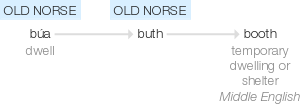Booth
Middle English (in the sense ‘temporary dwelling or shelter’): from Old Norse buth, based on búa ‘dwell’.
wiktionary
From Middle English bothe, from Old Norse búð (compare Swedish bod) and/or the commoner variant búð (> Scots buth), from Proto-Germanic *bōþō, *būþiz, *buþǭ, from Proto-Indo-European *bʰuH-. Compare Middle Low German bôde, Middle Dutch boede, German Bude.
etymonline
booth (n.)
c. 1200, mid-12c. in place-names, "temporary structure of boards, etc.," especially a stall for the sale of goods or food or entertainment, at a fair, etc., from Old Danish boþ "temporary dwelling," from East Norse *boa "to dwell," from Proto-Germanic *bowan-, from PIE root *bheue- "to be, exist, grow." See also bower, and compare German Bude "booth, stall," Middle Dutch boode, Lithuanian butas "house," Old Irish both "hut," Bohemian bouda, Polish buda, some of which probably were borrowed from East Norse, some independently formed from the PIE root.
